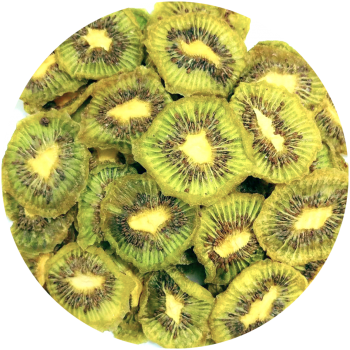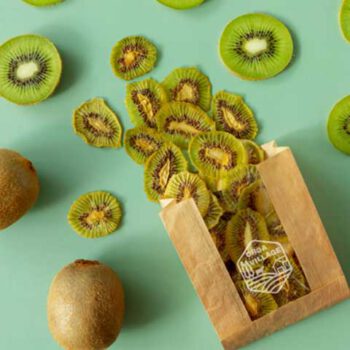
Export Dried Kiwi
CATALOGUE
Sweet, juicy kiwi may not always be practical for long-term storage or eating on the go, so consider dried kiwi fruit as an alternative with many benefits. This dehydrated fruit is low in fat, moderately low in calories, and provides healthy minerals and fiber. It is often quite high in added sugars, however, so only incorporate it into your meal plan if you eat a low-sugar diet.
Kiwi History
People have been eating kiwi for more than 300 years. The fruit originated in China. When people in New Zealand began to grow kiwis, they named the fruit after a bird called the kiwi, hoping that the name would make kiwis more appealing to consumers. Today, kiwis are sold around the world as a rich source of vitamin C and other nutrients.


How do you dehydrate Kiwi?
Dehydrated kiwi fruit is easy to pack, store and eat, offering busy people a convenient way to get good nutrition. The dehydration process removes much of the water content from kiwi slices, making them denser, chewier, and richer in nutrients per gram, but it also makes them higher in calories, sugar, and fat than a raw kiwi. If you are watching your intake of certain nutrients, read the labels to see how dried fruit compares to raw fruit.
Dry Kiwi Nutritions
Calories and Fat
A 1.8-oz. serving of dried kiwi fruit contains 180 calories. This is quite a bit more than the same serving of fresh kiwi, which has 30 calories. As dried kiwi is usually covered in sugar, the dried fruit calories also include added sugar. Despite the increased calories, a serving of dried kiwi fruit is a good option for snacking; The Diet Channel suggests eating 100 to 200 calories for between-meal snacks. A serving of dried kiwi also includes 0.5 g of fat, a low amount that makes this dehydrated fruit a good option for low-fat diets.
Carbohydrates and Fiber
Eat a serving of dried kiwi fruit, and you consume 43 g of carbohydrates. Your meal plan should have 225 to 325 g each day to boost your energy level. You also take in 0.5 g of fiber per serving of this dried fruit. Neither dried nor fresh kiwi provides a great deal of fiber – you need 25 to 38 g of fiber each day.
Minerals
Dried kiwi fruit is a good choice to boost your iron and calcium intake. One serving of this fruit provides 4 percent of the calcium you require each day. The calcium in dried kiwi bolsters bone density and strength. You also take in 3 percent of the daily recommended intake of iron, a mineral useful for increasing red blood cell production.
Sugar
Due to the typical preparation of dried kiwi fruit – the addition of granulated sugar – this fruit is high in sugar. One serving contains 23 g. Some of this sugar is natural, which does not damage your health.
sugar in your diet can contribute to unwanted weight gain and tooth decay. Look for dried kiwi without added sugar, avoid consuming more than 25 to 37 g of sugar daily.
Vitamin C
Although it is small, one kiwi contains more vitamin C than three oranges. dried kiwi always has more vitamin C per gram than it had before it was dehydrated. The United States Department of Agriculture’s Nutrient Database lists a typical kiwi as providing approximately 64 milligrams of vitamin C, or about 151 percent of the amount you need each day, per serving.
Other Vitamins and Minerals
Two kiwis provide 30 milligrams of magnesium, which helps your nerves function properly, and more fiber than a bowl of bran cereal. Kiwis also contain the phytochemical lutein, which helps prevent vision loss, and 10 percent of your recommended intake of folate, a vital nutrient for pregnant or nursing women. Although few fat-free foods offer a rich source of the cholesterol-lowering antioxidant vitamin E, kiwi contains about a milligram per serving.
Calories and Fat
One kiwifruit contains about 42 calories and less than .36 grams of fat. Although a 1.8-ounce serving of dried kiwi contains approximately 180 calories, its fat content remains negligible at only half a gram. Because it is dense in nutrients and virtually fat-free, dried kiwi is a healthy and reliable source of quick energy.
7 Benefits of Dried Kiwi Fruit
- Can help treat asthma
- Aids digestion
- Boosts the immune system
- Reduces risk of other health conditions
- Can help manage blood pressure
- Reduces blood clotting
- Protects against vision loss
Sepcotrading company exports the best kind of Iranian dried fruits and nuts like dried kiwi at the most affordable prices all around the world.
Contact Now
FAQ
Is dried kiwi good for you?
Dehydrated kiwifruit retains much of the healthful vitality as fresh kiwifruit. Of course, dehydration kiwifruit removes all of the water content from the fruit, so it shrinks during the drying process, leaving it small and energy-dense.
What does dried kiwi taste like?
Kiwi is a tremendously nutritious source of vitamins in a sweet, sharp, uniquely flavored fruit. We source bright green, tangy dried Kiwi Slices with a soft, slightly chewy texture and tart taste, and lightly dust them with sugar.
Is Kiwi good for losing weight?
They experienced higher vitamin C levels, a reduction in blood pressure, and a 1.2-inch (3.1-cm) reduction in waist circumference. Additional studies note that kiwi can help control blood sugar, improve cholesterol, and support gut health all additional weight loss benefits.
Can I dehydrate Kiwi?
Slice the peeled kiwis into 1/4-inch (6 mm) slices. Place on a dehydrator sheet and dehydrate at 135°F (37°C) for 6-12 hours. If you do not have a dehydrator, you can also place these on a cookie sheet in the oven at the lowest temperature, checking them after about 4 hours since an oven tends to be hotter.




